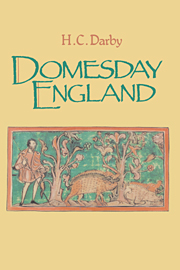Book contents
- Frontmatter
- Contents
- List of Maps
- Preface
- List of Abbreviations
- Chapter I THE DOMESDAY INQUEST
- Chapter II RURAL SETTLEMENTS
- Chapter III POPULATION
- Chapter IV ARABLE LAND
- Chapter V GRASSLAND, MARSH AND LIVESTOCK
- Chapter VI WOODLAND AND FOREST
- Chapter VII ANNUAL VALUES
- Chapter VIII DEVASTATED LAND
- Chapter IX INDUSTRY
- Chapter X BOROUGHS AND TOWNS
- Chapter XI THE WELSH MARCH
- Appendix 1 General Statistical Summary by Domesday Counties
- Appendix 2 Summary of Categories of Rural Population
- Appendix 3 Categories of Rural Population by Domesday Counties
- Appendix 4 Churches and Priests by Domesday Counties
- Appendix 5 The Shropshire Ploughland Formulae
- Appendix 6 The Leicestershire Ploughland Formulae
- Appendix 7 The Yorkshire Ploughland Formulae
- Appendix 8 References to Marsh
- Appendix 9 References to Forests
- Appendix 10 References to Hawks and Renders of Hawks
- Appendix 11 References to firma unius noctis/diei
- Appendix 12 Annual Values for Rural Holdings in 1086 by Domesday Counties
- Appendix 13 References to Iron and Renders of Iron
- Appendix 14 Statistical Summary of Mills by Domesday Counties
- Appendix 15 References to Vineyards
- Appendix 16 Statistical Summary of Boroughs
- Appendix 17 References to Markets
- Appendix 18 References to Mints
- Appendix 19 Extension and Translation of examples of Domesday entries
- Appendix 20 The Domesday Geography of England: Editors and Contributors
- Appendix 21 On the Writing of Domesday Geography
- Index
Chapter I - THE DOMESDAY INQUEST
Published online by Cambridge University Press: 05 June 2012
- Frontmatter
- Contents
- List of Maps
- Preface
- List of Abbreviations
- Chapter I THE DOMESDAY INQUEST
- Chapter II RURAL SETTLEMENTS
- Chapter III POPULATION
- Chapter IV ARABLE LAND
- Chapter V GRASSLAND, MARSH AND LIVESTOCK
- Chapter VI WOODLAND AND FOREST
- Chapter VII ANNUAL VALUES
- Chapter VIII DEVASTATED LAND
- Chapter IX INDUSTRY
- Chapter X BOROUGHS AND TOWNS
- Chapter XI THE WELSH MARCH
- Appendix 1 General Statistical Summary by Domesday Counties
- Appendix 2 Summary of Categories of Rural Population
- Appendix 3 Categories of Rural Population by Domesday Counties
- Appendix 4 Churches and Priests by Domesday Counties
- Appendix 5 The Shropshire Ploughland Formulae
- Appendix 6 The Leicestershire Ploughland Formulae
- Appendix 7 The Yorkshire Ploughland Formulae
- Appendix 8 References to Marsh
- Appendix 9 References to Forests
- Appendix 10 References to Hawks and Renders of Hawks
- Appendix 11 References to firma unius noctis/diei
- Appendix 12 Annual Values for Rural Holdings in 1086 by Domesday Counties
- Appendix 13 References to Iron and Renders of Iron
- Appendix 14 Statistical Summary of Mills by Domesday Counties
- Appendix 15 References to Vineyards
- Appendix 16 Statistical Summary of Boroughs
- Appendix 17 References to Markets
- Appendix 18 References to Mints
- Appendix 19 Extension and Translation of examples of Domesday entries
- Appendix 20 The Domesday Geography of England: Editors and Contributors
- Appendix 21 On the Writing of Domesday Geography
- Index
Summary
The Norman Conquest in 1066, unlike the Anglo-Saxon and Scandinavian invasions, was not a mass movement of people but the work of a small power group. Twenty years after their coming, the Normans instituted the enquiry that resulted in Domesday Book. With hindsight we can say that it came at a fortunate moment for us because it enables us to examine the economic and social foundations of the geography of England after the Anglo-Saxons and Scandinavians had firmly established themselves in their new home.
THE ANGLO-SCANDINAVIAN BACKGROUND
The Anglo-Saxons had arrived in the fifth and sixth centuries, and the Scandinavians in the eighth and ninth – Danes from the east and Norse by way of the western seas. Whatever the continuity between Roman Britain and Anglo-Scandinavian England – and it was certainly much greater than was at one time believed – the fact remains that, Cornwall apart, the villages the Normans encountered bore names that were certainly not Celtic. Where the Englishman Babba had made a ‘stoc’ or settlement in Wiltshire, there stood Babestoche in 1066 which is Baverstock today; and where the Scandinavian Bekki had made a ‘by’ or settlement in Lincolnshire, there stood Bechebi which is Bigby today. The progress of settlement must have been interrupted, time and again, by the mutual struggles of the Anglo-Saxon states, and by the campaigns of the Anglo-Danish conflict; but, even so, large stretches of countryside were colonised and transformed, and the woodland was pierced by ‘dens’ and ‘leans’ and ‘skogrs’ until there were well over 13,000 vills in existence.
- Type
- Chapter
- Information
- Domesday England , pp. 1 - 14Publisher: Cambridge University PressPrint publication year: 1977

